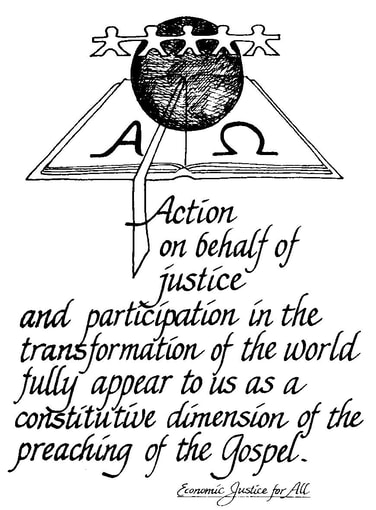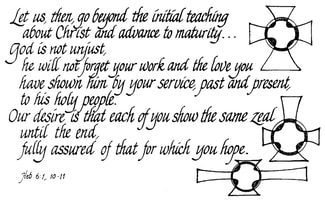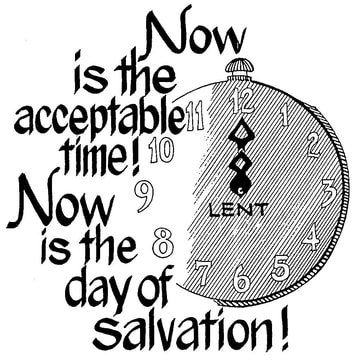 Let's continue with the closing of the prayer in Ephesians 3 with verses 20 and 21. Paul's ending words of his prayer for the Ephesians is an ode to God, "Now to him who by the power at work within us is able to accomplish abundantly far more than all we can ask or imagine, to him be glory in the church and in Christ Jesus to all generations, forever and ever. Amen" (NRSV). It sounds familiar because it is Paul's example we are following when we end prayers with something like, "To God be the glory forever and ever. Amen." But let's take a look at that first verse. God is able to accomplish more than we can ask or imagine by his power within us. He has placed his power within us. Do we believe that? It is the word of God. Do we believe that God has placed his power within us? If not, why not? Supposedly it can do more than we can ask or even imagine. The verse carries through Paul's previous prayer that we are strengthened in our inner being with God's power through the Holy Spirit. It seems to me that if we accept this as the word of God then we accept it as being true. We are strengthened by the power of God to accomplish more than we can ask or imagine. It implies that what we imagine limits us. We don't ask for enough. We are letting the power that raised Christ from the dead go to waste. I imagine that what each of us can do is different from the other. We are one body, one spirit in one Lord, one faith, one baptism (Eph 4:4-5). The parts of the body are made to do different things, but all work together. We all have a part to play. Let's not let the power of God go to waste. Dream. Imagine. Ask. To God be the glory forever and ever. Amen. #Paul #Paul's Prayers #Prayer #Ephesians
0 Comments
 We have spent time already looking at Ephesians 1:16-19 and 3:15-16. Let us continue with 3:17-19 which states "that Christ may dwell in your hearts through faith, as you are being rooted and grounded in love. I pray that you may have the power to comprehend, with all the saints, what is the breadth and length and height and depth, and to know the love of Christ that surpasses knowledge, so that you may be filled with all the fullness of God" (NRSV). Whew! What a mouthful. Paul loves those run-on sentences. He gets so excited with what he is praying that he can't stop. His infectious joy overflows at the inclusion of Gentiles in the body of Christ. (As a Pharisee, I doubt Paul ever thought to see such a thing.) So his prayer is that, since they have come to faith, Christ dwell in their hearts and that Christ's presence in them ground them in love for others. This love for others should be deepened by coming to understand the breadth, length, height and depth of God's love which without revelation is unknowable. He has already prayed for them to have this revelation as we saw in 1:17. Really, this prayer in chapter 3 is a continuation of the prayer in chapter 1. So how does this lead us to pray? It seems that we should pray for a greater knowledge of the depth of God's love. It's a love that never runs out, never gives up. And, if no one has told you this today, let me say it now: God loves you. #Paul #Prayer #Prayers #Revelation #Ephesians #St.Paul  Another section of prayer in Ephesians is in 1:16-19. It begins with the thought that Paul always gives thanks for them. This is not unusual for Paul. He seems to make thanksgiving for other believers a regular part of his prayer. ("I do not cease to give thanks for you as I remember you in my prayers" 1:16. Also see Romans 1:8, 1 Cor 1:4, Phil 1:3) Is it a regular part of our prayer? Do we start our prayer time by giving thanks to God whether for people or circumstances or God's provision? If not, it can be a good way to begin (see 1 Thes 5:16-18). Paul goes on in Ephesians to pray that God the Father give them a spirit of wisdom and revelation as they come to know him. Why? So that they may know the hope to which God has called them, know the riches of his inheritance, and know the immeasurable greatness of his power. God's wisdom and revelation bring greater knowledge of God which will bring knowledge of the hope, riches and power that he supplies. This growth in wisdom and revelation is supernaturally provided. It is not worldly wisdom or revelation gained through study or practice. It is a gift as promised in Isaiah 11, now made available through the work of Jesus Christ. Through wisdom and revelation we have the hope of a wonderful eternal life, the riches of his blessings both on earth and in the world to come, and the power that raised Christ from the dead and seated him in heaven at the right hand of the Father. So let's apply this to our prayer life. Do we pray for wisdom and revelation for ourselves? It is a good thing to do, especially before we read Scripture. Do we have hope, riches and power in our lives? The power he gives us is to spread the Gospel. Many people envision spreading the Gospel as standing on the street corner yelling at people. In reality it is looking for the opportunities in our daily life to be good to others, pray with them and tell them about Jesus and what he has done for us. It does not have to be a scary proposition. Do we pray for others to be blessed with God's wisdom and revelation? This would particularly include family members and those for whom we are responsible. Do we pray such a prayer for our pastor? Pastors need wisdom and revelation from God every day. And they need our prayers. So let us follow in Paul's footsteps with this example of prayer. Let us give thanks in all things and ask for supernatural wisdom and revelation. Let us pray. #Paul #Prayer #Prayers #Wisdom #Revelation  Paul's authority, ministry and preaching were under attack when he wrote to the church in Galatia. Nevertheless he wrote to them with grace about grace. "I pray over you a release of the blessings of God's undeserved kindness and total well-being that flows from our Father-God and from the Lord Jesus" (Gal 1:3-4 TPT). Paul always begins and ends his letters with a benediction, not a criticism. Even though the letter was written for correction and clarification of their belief and practice, he blessed them again at the end, saying, "Finally my beloved ones - may the wonderful grace of our Lord Jesus, the Anointed One, be flowing in your spirit. So shall it be!" (Gal 6:18 TPT). In the opening benediction, Paul describes God's kindness as "undeserved". It is a theme of this letter - grace and salvation are unearned by human actions. Paul wishes the Galatians "total well-being" even though he is taking them to task. Paul sets the example for us that just because we disagree with someone we are not free to wish them ill, or to pray that God "strike them down" for their disbelief or heresy. No, we are to bless them, praying for an in-pouring of God's grace and that they be well in body, mind and spirit. For Reflection: Is this how we pray for those with whom we disagree? #Paul #Prayer #St.Paul #Grace  We may know more about the apostle Paul's prayer life than any other New Testament person's simply because his letters contain prayers for the various recipients. In this series we will examine some of these recorded prayers to mine them for the power they demonstrated. "So I kneel humbly in awe before the Father of our Lord Jesus, the Messiah, the perfect Father of every father and child in heaven and on the earth. And I pray that he would unveil within you the unlimited riches of his glory and favor until supernatural strength floods your innermost being with his divine might and explosive power" (Ephesians 3:15-16 TPT). He begins, "So I kneel humbly in awe before the Father". Did his prayer time include a type of transport to the throne room of God where he could kneel in awe in the actual divine presence? Or was it in his mind's eye that he experienced the sensation of being in God's presence? Did he physically kneel beside his bed or in his prayer corner? Maybe he knelt to pray as he was dictating the letter? This last option seems less likely to me. I've always pictured Paul pacing the room as he dictates his letters, sometimes getting caught up in the presence of and knowledge of God, sometimes aggrieved by the situations he is addressing. Based on 2 Corinthians 12:1-6 it certainly seems possible that he may be indicating he had a supernatural vision or ecstatic experience. In whatever way he "went", he approached the Father, the Source, the Top Guy. He felt confident that he could go to the Father and be heard. Paul is not a thief in the night trying to sneak in through the back door. He went straight to the CEO, no middle managers or supervisors for him. He went to the Father as any son would ordinarily do. Paul knows who he is and whom to approach with his request. He's confident. And what is his prayer request for the group in Ephesus? In this case it is not for the Father to give something new; it is for God to let them see what they already have been given; i.e., the Father's glory and favor and the unlimited riches that they represent. God's glory and favor in us are unlimited riches. I believe the next few sentences help us to understand what Paul means by glory and favor: the "life of Christ", the "resting place of his love", the "love of Christ", "endless love beyond measurement that transcends our understanding". These are the things that Paul prays will be unveiled within us. They are already within us. But perhaps they need to be unveiled so that we can see them. Do we see these riches in our life? If not, we can ask God to unveil his glory and favor in us. We can participate in and benefit from Paul's prayer for the church in Ephesus. #St.Paul #Paul #Prayer #Ephesians  Having said that I would write on justice during Lent this year, I find that I have not addressed at all what I thought I would. The Scriptural texts that I have used seem strange even to me. And today I use another odd one. Romans 12:9-21 is really about how we treat one another, how our relationships should be transformed when we become Christian. For example, love one another, serve the Lord by serving others, be joyful, be hospitable to guests. These may be common ways of acting for anyone. But then Paul goes on to speak of how we should relate to our "enemies." I suspect most of us relate to our enemies by avoiding them. But that is not what Paul anticipates. He says we should bless them, live happily with them, celebrate with them, don't hold a grudge, don't think we are better than they. "Beloved, don't be obsessed with taking revenge, but leave that to God's righteous justice. . . . 'If your enemy is hungry, buy him lunch! Win him over with kindness. For your surprising generosity will awaken his conscience, and God will reward you with favor.' Never let evil defeat you, but defeat evil with good." (TPT) It's a tall order. And as in another Scripture where it is asked, "Who is my neighbor?", I am tempted to ask, "Who is my enemy?" In America today it seems as though we have classified entire groups of people as our enemy: immigrants, the poor, the rich, those who wear a mask or those who don't, Republican or Democrat, White, Black or Brown, followers of QAnon. Take your pick. There are plenty of enemies to go around. Buy him lunch, be kind, generous, defeat evil with good. We might even add listening during lunch. #justice #peace #Lent #prayerandfasting #generosity  "What is justice?" may seem like a simple question. But what is the first thing that comes to your mind when you hear it? Some think of punishment: who deserves it, how should it be meted out, where should it be administered, how long should it last. Others think of the lack of justice: disproportionate rates of poverty, higher rates of arrest among minorities, the work load of public defenders with too little time to concentrate on the abundance of clients, implicit bias and racism, who is offered a plea deal, the role of rehabilitation and keeping people out of prison to start with. Both kinds of justice aim for transforming the world. But one would lessen the need for the other. #justice #fastingandprayer #prayer #Lent #punishment #reform  Captain America, Steve Rogers, in the movie The First Avenger, is a skinny, asthmatic guy who wants to fight the Nazis. Finally he is accepted into a special unit where he is the least of the raw recruits and he is ridiculed and bullied from the officers on down. One day in the training yard the CO tosses a (supposedly) live grenade into their midst. Everyone runs for cover except Steve. He runs toward the grenade and throws himself on it. He is willing to die for those who fought, bullied and shamed him. Not what anyone expected. Upon reflection, it struck me as the Christ-like thing to do. As the Scriptures tell us, Jesus died for us even though we did not deserve it and still don't deserve it. In fact, we can never deserve it. God does not mete out to us the punishment we deserve for our sins, but the mercy of his Son's death for us. He gives us mercy in place of justice. Not what anyone expected. We are challenged by Jesus and Captain America to apply mercy rather than justice. Are we up to the challenge? #Mercy #Justice #Romans5 #CaptainAmerica #SteveRogers #Prayer #Unexpected  God is not unfair, unjust, or evil. I would call that damning Him with faint praise, but it is what is said in Hebrews 6:10. The context though is that God will remember our good works even though he chooses not to remember our sins which we have repented. What a deal that is. The author continues on, noting the group's support of others and #encourages them not to lose their enthusiasm (Heb 6:11-12). Great words of advice for these days of pandemic, deprivation and unrest. #justice #prayer #Lent #enthusiasm #Hebrews  "God seems to reveal Himself to man as rapidly as man . . . is prepared to receive the revelation". So says John G Lake in his reflection on Baptism in the Holy Spirit. Although Lake was speaking of God's revelation of himself to mankind over the centuries, perhaps we should ask ourselves, "How ready am I to receive further revelation of God?" Sometimes we get stuck in the "same old, same old". We can ask God to show us where we are stuck and how we can get "unstuck". Now is the time; today is the day. #JohnGLake #Lent #Prayer #Baptism #Baptism in the Holy Spirit |
AliceI started this website and blog on May 1, 2012. I am a Catholic who has been in ministry for many years. I first developed what I would call a close relationship with Jesus in the early 1970s. Ever since then I have been praying with people for healing and other needs. It is because I have seen so many of these prayers answered that I am so bold as to offer to pray for you individually through this website and phone line. Archives
July 2021
Categories
All
|
Proudly powered by Weebly

 RSS Feed
RSS Feed